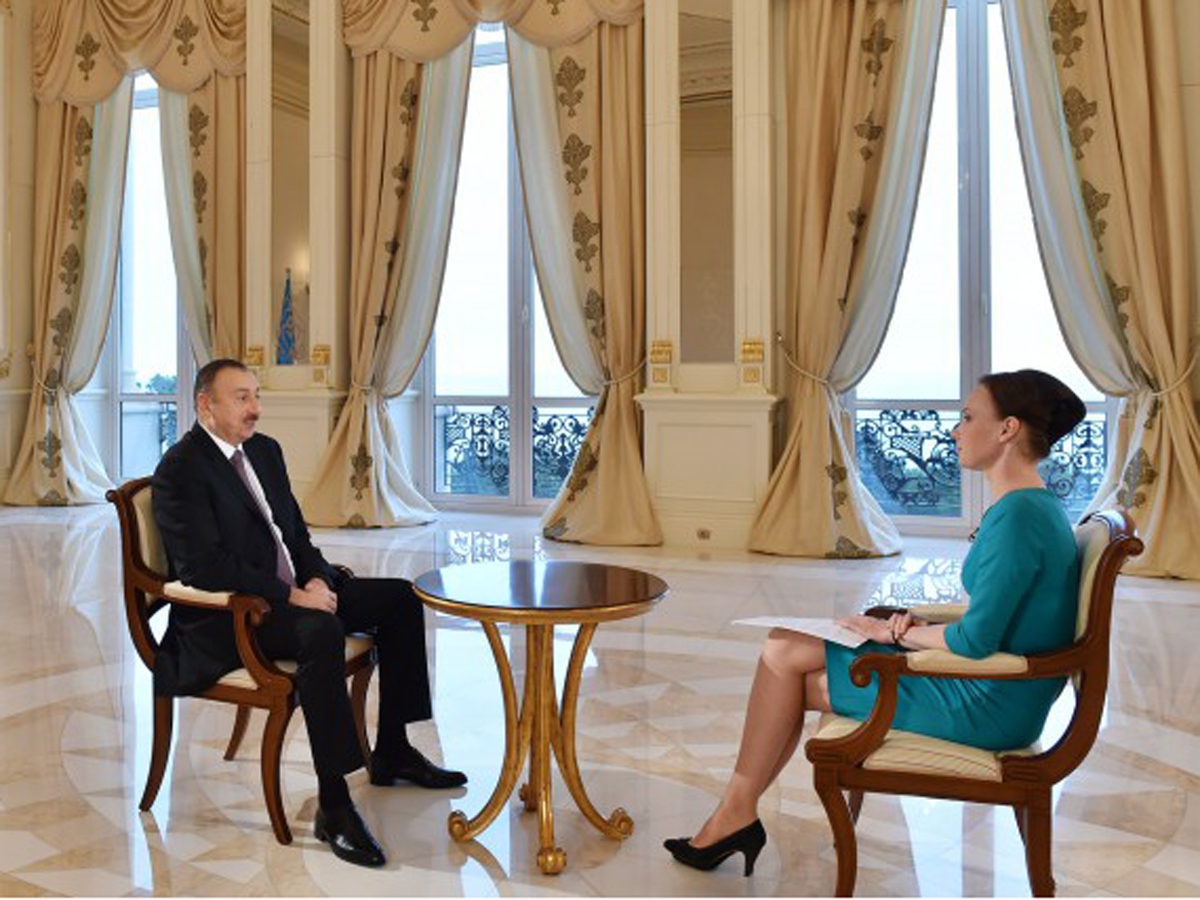Baku, Azerbaijan, Dec. 2
Trend:
Armenia does not want peace, Azerbaijani President Ilham Aliyev said in an interview to "Russia-24" TV channel All-Russia State Television and Radio Broadcasting Company.
Speaking of the Nagorno-Karabakh conflict, the president said Armenia doesn't want to resolve the long-lasting issue with Azerbaijan.
"It wants to leave everything as it is and to maintain the status quo," he said. "Unfortunately, we cannot talk about the success in the negotiation process."
"Although the presidents of the OSCE Minsk Group co-chairing countries, namely, Russia, US and France have repeatedly stated that the status quo is unacceptable and must be changed," the president said.
President Aliyev said the change of the status quo means the de-occupation of Azerbaijan's territory, which is the main condition for resolving the conflict.
The conflict between the two South Caucasus countries began in 1988 when Armenia made territorial claims against Azerbaijan. As a result of the ensuing war, in 1992 Armenian armed forces occupied 20 percent of Azerbaijan, including the Nagorno-Karabakh region and seven surrounding districts. The two countries signed a ceasefire agreement in 1994. The co-chairs of the OSCE Minsk Group, Russia, France and the U.S. are currently holding peace negotiations.
President Aliyev said the Armenian-Azerbaijani Nagorno-Karabakh conflict differs from all other conflicts in the post-Soviet area, because there are the UN Security Council resolutions for its solution.
"There are four resolutions, rather than one, requiring immediate and unconditional withdrawal of the Armenian troops from the occupied territories," President Aliyev said. "They have not been fulfilled for more than 20 years. Unfortunately, there is no mechanism for their implementation, as Armenia simply ignores them. These resolutions must be the basis of the conflict settlement, there is no other way."
President Aliyev said this year differs from the previous years by the intensive negotiation process.
"The OSCE Minsk Group co-chairing countries in the face of the presidents of these countries have actively participated in the negotiation process," the president said. "I don't think it has ever happened before. Russian President Vladimir Putin held a meeting with the presidents of Azerbaijan and Armenia in Sochi in August. In September, US Secretary of State Kerry held a similar meeting with us, and in late October French President Francois Hollande also invited the presidents of Azerbaijan and Armenia to meet in Paris. We held bilateral and trilateral discussions."
The president said besides the settlement of the conflict and the negotiation process, one of the issues was about strengthening the confidence-building measures, the desire to have fewer incidents on the contact line and that the sides' would trust each other more.
"Both sides - Armenia and Azerbaijan - positively evaluated the meeting in Paris," Ilham Aliyev said, adding that this was also mentioned in the public comments.
However, just two weeks later Armenia began to hold the so-called military exercises in the occupied part of Azerbaijan, he stressed.
"Moreover, they were holding these exercises not in Armenia, or even within the Nagorno-Karabakh autonomous region, but on the territory of Aghdam district of Azerbaijan, just along the line of contact," President Aliyev said.
He went on to add that according to the data of the Armenian side, 47,000 servicemen and thousands of types of equipment were involved in the exercises.
"The question is what was the need to arrange provocations immediately after a positive meeting in Paris?" the Azerbaijani president said.
With regard to the efficiency of international institutions in addressing contemporary conflicts, President Aliyev said what is happening in the world demonstrates that international institutions don't cope with their responsibilities, and perhaps, don't justify the hopes they are entrusted with.
"This also applies to our case, when for over 20 years the OSCE is like a mediator," he said. "This also applies to the matters that are within the competence of the UN."
The president further said that a deformation of international institutions is going on in the world, which is a very alarming and dangerous tendency.
"The leading countries of the world have to say their clear word here not only with statements, but also with respect to the decisions that are taken. Decisions are not made but actions are carried out - we have seen this too many times in the modern world, not so long ago," the president said.
The president said the collapse of the existing mechanisms of international cooperation will lead to a total chaos.
"I think that in this historical period of time the responsibility falls on the leading countries of the world. They mustn't violate the international law in the first place. They should support international law and the world order that formed after World War II," President Aliyev said.








